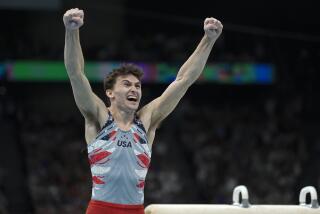Perseverance of gymnasts Sam Mikulak, Shane Wiskus could boost U.S. in Olympics
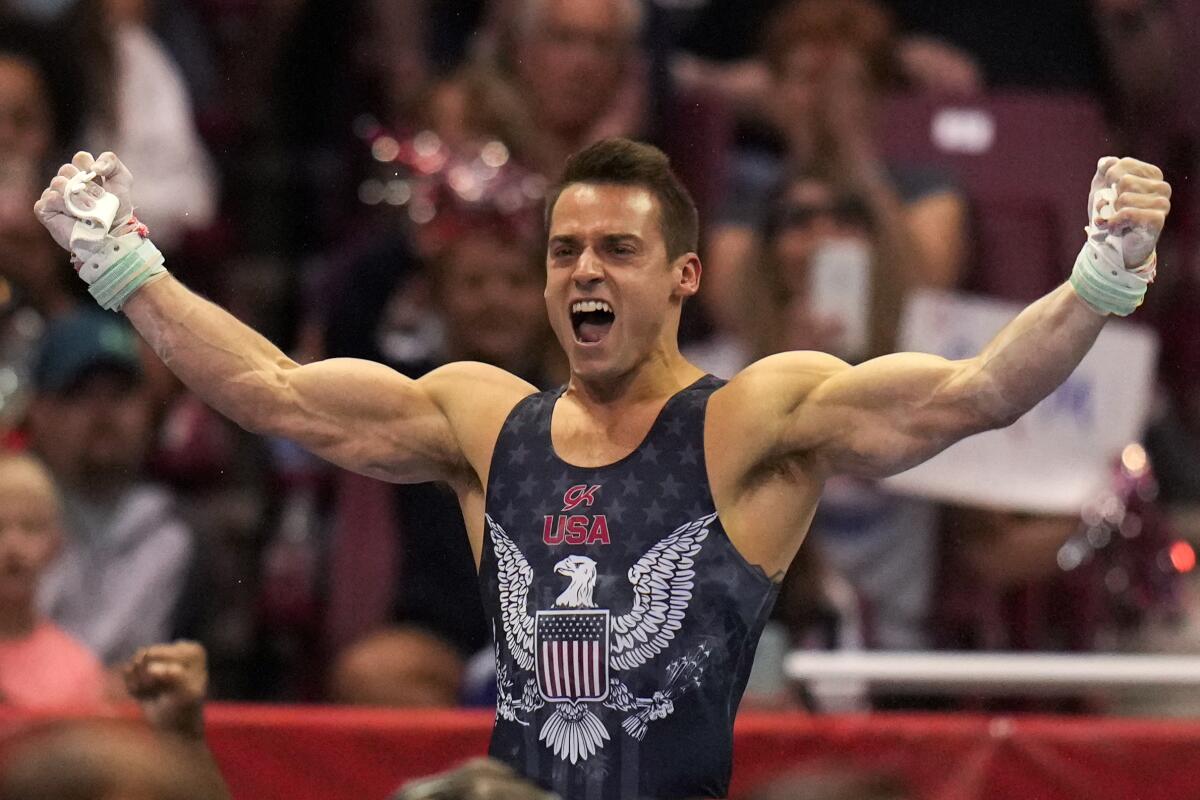
- Share via
ST. LOUIS — When he lost his grip and slid off the pommel horse, the final event on the final day of the U.S. men’s Olympic trials, Sam Mikulak wondered whether he also had lost his chance at a third trip to the Summer Games.
At 28, he hears the vigorous footsteps of younger competitors. The Newport Beach native and Corona del Mar High graduate wondered whether one of them might overtake him Saturday in the last few agonizing moments of the race for the four available spots on the Tokyo squad and the “plus one” individual berth, providing a less-than-triumphant finish to his determined battles with injuries and mental health issues the last few years.
“Was that the one moment that just blew it for me?” he recalled thinking, half-expecting he would lose out to Brandon Briones of Stanford.
When the COVID-19 pandemic forced Shane Wiskus to practice in his yard and train alone in local gyms — and when he learned that the University of Minnesota had decided to cut its already meagerly funded men’s gymnastics program — he refused to concede defeat. He kept going, even though it meant uprooting his life and moving to the U.S. Olympic and Paralympic Training Center in Colorado Springs to continue his promising career.
“I’ve just been put through the wringer,” he said. “I told myself, ‘I’ve been through enough. I’m ready to show what I can do at this competition.’ ”
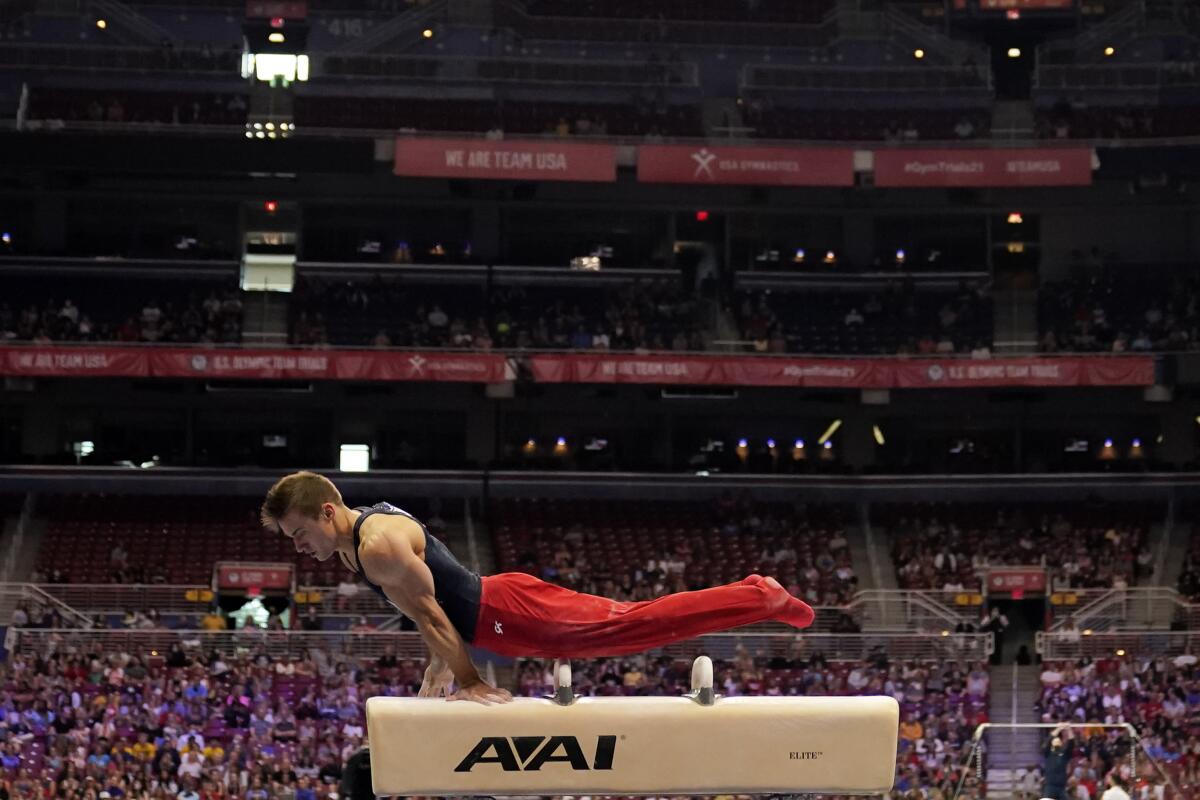
In gymnastics, as in life, falling doesn’t dictate failure — it’s how well you get back up after being knocked down that matters most. The defiance and perseverance that motivated Mikulak and Wiskus to overcome personal and athletic obstacles should be assets to the U.S. men’s team at the Tokyo Games, where they will try to revive U.S. men’s flat Olympic fortunes.
A selection committee nominated fourth-place trials finisher Mikulak and third-place finisher Wiskus to the Tokyo team, along with top trials all-around finishers Brody Malone and Yul Moldauer. The individual spot was awarded to Alec Yoder, a former NCAA pommel horse champion for Ohio State.
The alternates are Briones; Cameron Bock of the University of Michigan; Akash Modi of Stanford, and Allan Bower of the University of Oklahoma. Rings specialist Alex Diab of the University of Illinois is the alternate for the plus one spot. They’ll travel to Japan to train, knowing that one teammate’s positive test for COVID-19 could thrust any of the alternates from the background to the spotlight.
Malone’s Olympic nomination added another line to a glittering resume that this year grew to include an NCAA all-around title, his first U.S. all-around crown, and Olympic trials all-around champion. Sure-footed and calm, consistent and precise, the 21-year-old native of Johnson City, Tenn., compiled 171.600 points in the two-day event at the Dome at America’s Center. He had the top two-day high bar score and was second on floor exercise and rings.
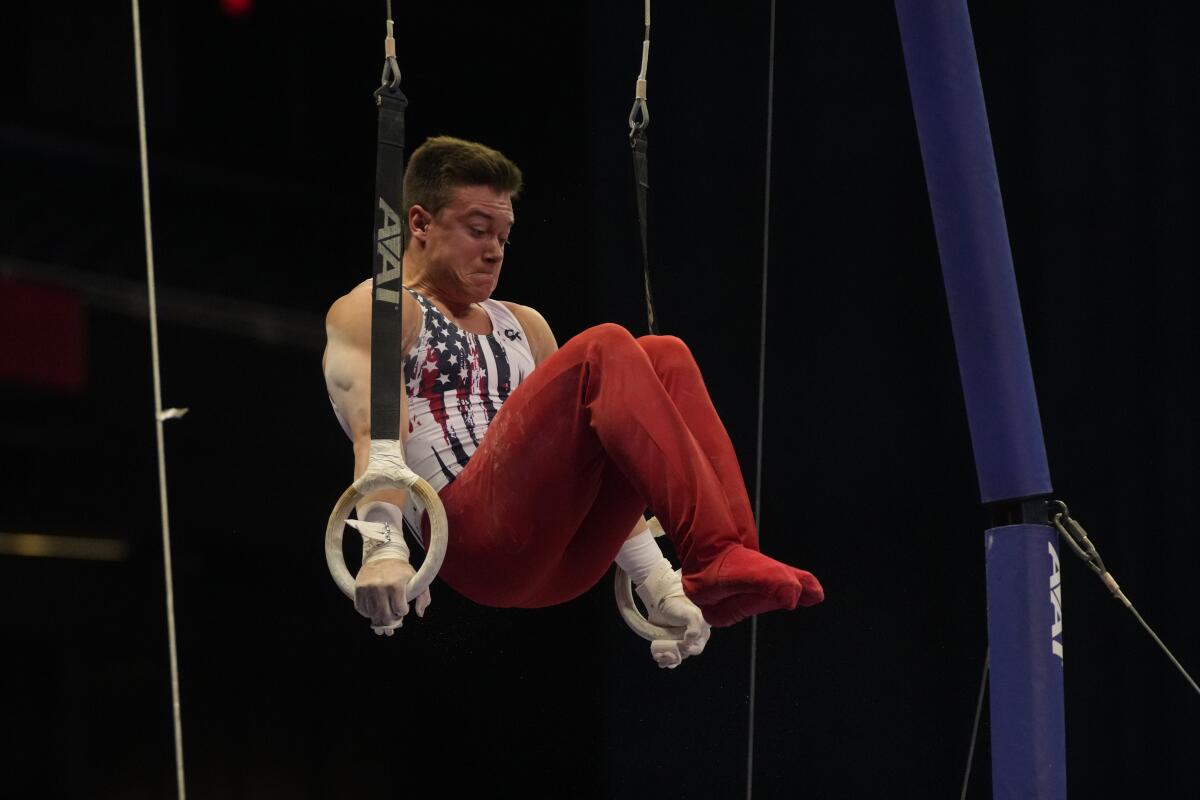
“What a stud,” Brett McClure, the high performance director for USA Gymnastics, said of Malone’s high bar performance. “He competed with ice in his veins. He just looked unshakeable. I was about to fall out of my seat on every high bar release move, but he caught them perfectly.”
Malone rarely shows emotion, and he tried to maintain that Saturday by ignoring the scoreboard. “I try not to look at the scores generally, but, I mean, they announced it,” he said. “I think after pommel horse I was pretty confident in the last two events [rings and vault], so I was pretty happy that. But I had to stay in the competitor’s mindset and stay in my bubble and finish strong.”
Moldauer also won an automatic nomination for finishing second (168.600 points) while earning a top-three score on at least three of the six apparatus. He was first on parallel bars, second on pommel horse, third on floor exercise and tied for third on rings. If Malone is ice, Moldauer brings fire to the competition floor.
“The more you can dance around and have fun, it puts out energy that these guys feel,” he said. “We’re here to put on a show. People are coming to watch good gymnastics. ... When you work so hard in the gym and you go out there and hit the routine, you’re full of emotions. Why hit it? Why not show these people how hard you’ve been working and get them involved? That gives you a boost as well.”
Wiskus, who trains with Mikulak in Colorado Springs, was a solid third with 168.150 points, able to finally put behind him a three-fall performance on the high bar at the U.S. championships earlier this month. “Man, it’s just been a crazy year,” said Wiskus, 22. “You just can’t make this stuff up.”
Mikulak (166.750 points) said his name was called after those of Malone and Moldauer when the selection committee relayed its decision to the gymnasts. “I was expecting they would announce Shane before either me or Brandon,” Mikulak said. “There was this wave of relief, ‘Oh my God, I actually did it.’
“This has been the hardest year to make the team ever in my life. I would say this is the one that feels the hardest.”
His suspicion that Briones (166.700 points) might beat him out was well-founded. “What a smart guy. Sam was spot on,” McClure said. “He’s still on the upswing, so it was scary to see a fall and it was exciting to see Brandon hit 12 for 12.”
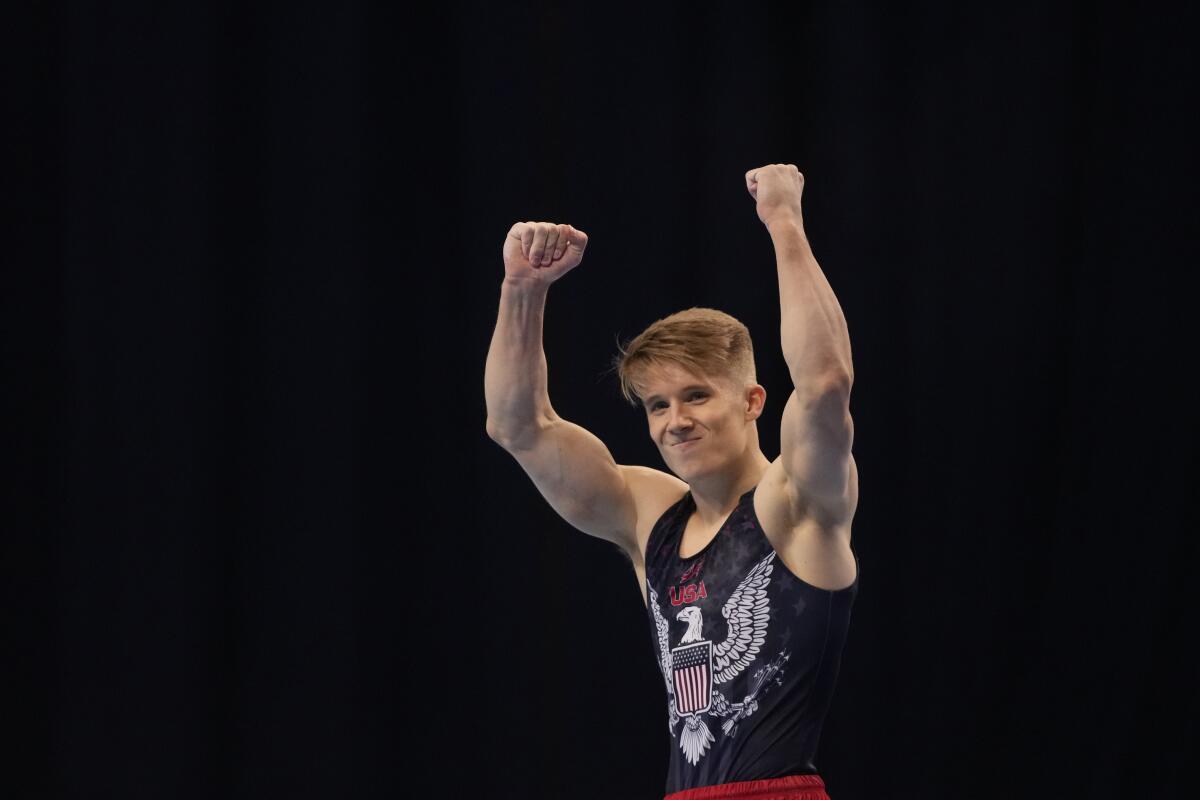
Mikulak will bring experience to a young team. In 2012, he was part of the fifth-place men’s team and finished fifth on vault; the men’s team was fifth again at Rio in 2016, and he was fourth in the high bar, seventh in the all-around and eighth in floor exercise.
“I’ve been looking up to Sam since he started his national champ streak,” Wiskus said of Mikulak, who won six U.S. all-around titles between 2013 and 2019. “Moving to the training center, that kicked off our friendship. To have someone that understand you and they’re there for you, that’s super amazing. Training with him has made me a better gymnast, and I’m extremely grateful for that opportunity.”
But are they good enough to be in the running for a team medal? The U.S. men last won a medal in 2008, capturing bronze; they haven’t won gold since the 1984 Games in Los Angeles.
“It’s been challenging,” McClure said. “Every Olympics has been a different scenario, whether it be the difficulty level is right there but the consistency wasn’t [or vice versa]. We’re going to have to align all the stars to match up the difficulty and execution with the rest of the world. I’m tired and I know these guys are tired of playing catchup.”
The spirit and resilience shown by Mikulak and Wiskus can only help in what figures to be a tough fight.
More to Read
Go beyond the scoreboard
Get the latest on L.A.'s teams in the daily Sports Report newsletter.
You may occasionally receive promotional content from the Los Angeles Times.

